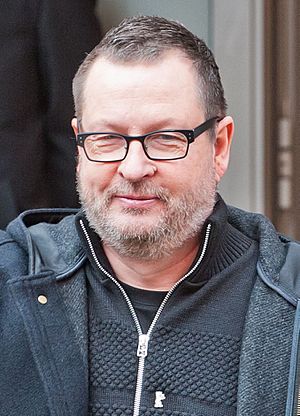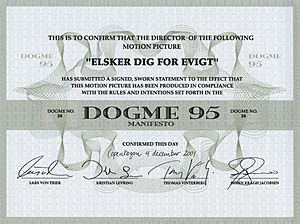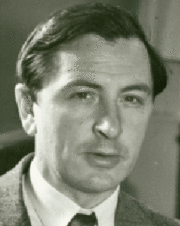Lars von Trier facts for kids
Quick facts for kids
Lars von Trier
|
|
|---|---|

Trier at the 64th Berlin International Film Festival, 2014
|
|
| Born |
Lars Trier
30 April 1956 Kongens Lyngby, Denmark
|
| Alma mater |
|
| Occupation | Film director, screenwriter |
| Years active | 1967–present |
|
Notable work
|
Filmography |
| Movement | Hyperrealism, Dogme 95, German Expressionism |
| Spouse(s) |
Cæcilia Holbek
(m. 1987; div. 1995)Bente Frøge
(m. 1997; div. 2015) |
| Children | 4 |
| Awards | Palme d'Or, EFA, Cesar, Bodil, Goya, FIPRESCI |
| Honours | Knight of the Order of the Dannebrog |
Lars von Trier (born 30 April 1956) is a famous Danish film director, producer, writer, actor, and songwriter. He is known for making unique and often challenging films.
Contents
Early Life and Education
Lars Trier was born in Kongens Lyngby, Denmark, which is just north of Copenhagen. His parents were Inger Høst and Fritz Michael Hartmann. He grew up believing his stepfather, Ulf Trier, was his biological father until 1989.
He studied film theory at the University of Copenhagen. Later, he learned how to direct films at the National Film School of Denmark. When he was 25, he won two awards for his student films, Nocturne and Last Detail. Around that time, he added "von" to his name. This was possibly a playful nod to other directors who had also added "von" to their names, like Erich von Stroheim. His graduation film, Images of Liberation, was even shown in cinemas.
Career Highlights
Early Films: The Europa Trilogy
In 1984, Lars von Trier made a big splash with his film The Element of Crime. This movie won many awards at international festivals, including a special prize at the Cannes Film Festival. It was known for its slow pace and dark, dream-like visuals.
His next film, Epidemic (1987), also showed at Cannes. It told two stories that eventually came together. He then directed Medea (1988) for television, which won an award in France.
Von Trier often groups his films into sets of three, called trilogies. The Element of Crime was the first in his Europa series. This trilogy explored difficult times in European history. It also included Epidemic. He finished this trilogy in 1991 with Europa (also known as Zentropa). This film won a special jury prize at the 1991 Cannes Film Festival.
In 1992, von Trier and producer Peter Aalbæk Jensen started their own film company called Zentropa Entertainment. They wanted more freedom to make their films. Zentropa has produced many movies and TV shows, not just von Trier's. To help the company, von Trier made the TV miniseries The Kingdom (1994) and The Kingdom II (1997). These shows were set in a Danish hospital. A third season was planned but sadly canceled after two main actors passed away.
Dogme 95 and the Golden Heart Trilogy
In 1995, von Trier and Thomas Vinterberg created something new called Dogme 95. This was a set of rules for making films. It encouraged filmmakers to avoid common techniques like studio lighting, special sets, costumes, and background music. Dogme 95 became very popular and influenced filmmakers around the world. In 2008, von Trier and other Dogme directors received an award for their impact on world cinema.
Von Trier gained international fame with his Golden Heart films. These movies are about kind-hearted heroines who stay good despite facing many sad events. This trilogy includes Breaking the Waves (1996), The Idiots (1998), and Dancer in the Dark (2000). While all three share a similar style, only The Idiots fully followed all the Dogme 95 rules.
Breaking the Waves won a major award at the Cannes Film Festival. Its unique look, with shaky cameras, hinted at Dogme 95. The Idiots was also nominated for a top award at Cannes. In 2000, von Trier's musical film Dancer in the Dark, starring musician Björk, won the highest award at Cannes, the Palme d'Or. One of its songs, "I've Seen It All," was even nominated for an Academy Award.
Later Works and Trilogies
In 2003, von Trier made The Five Obstructions with his friend and mentor, Jørgen Leth. This documentary challenged Leth to remake his old short film five times, each time with a different difficult rule.
Von Trier also planned a trilogy called Land of Opportunities. It included Dogville (2003) and Manderlay (2005). These films had a very unique look. Actors performed on a bare stage, with buildings marked by chalk lines on the floor. Dogville starred Nicole Kidman, and Manderlay starred Bryce Dallas Howard. Both films explored ideas about American society, like intolerance.
In 2006, von Trier released The Boss of It All, a comedy filmed with a special computer-controlled camera system he called Automavision. He also wrote an autobiographical film, The Early Years: Erik Nietzsche Part 1 (2007), which was about his time as a film student.
The Depression Trilogy
The Depression trilogy includes Antichrist and Melancholia. These films star Charlotte Gainsbourg and explore characters dealing with sadness and depression. This trilogy is said to reflect von Trier's own experiences with depression.
Antichrist is about a couple who go to a cabin in the woods after a sad event. It premiered at the 2009 Cannes Film Festival, where Charlotte Gainsbourg won the Best Actress award.
Melancholia, released in 2011, is a drama about two sisters played by Kirsten Dunst and Charlotte Gainsbourg. It tells the story of a planet about to crash into Earth. This film also competed at the 2011 Cannes Film Festival, and Kirsten Dunst won the Best Actress award.
Recent Projects
In 2015, von Trier started working on The House That Jack Built, which premiered at the 2018 Cannes Film Festival in 2018.
More recently, von Trier announced a new film called Études, which will be a collection of ten short black and white films. In 2020, it was also announced that he would make a third and final season of his miniseries The Kingdom, titled The Kingdom Exodus. This new season was filmed in 2021 and released in 2022. It received good reviews from critics. In 2024, he announced another new film called After.
Influences
Lars von Trier has been greatly influenced by the work of other filmmakers. He especially admires Carl Theodor Dreyer and the film The Night Porter. He was so inspired by Jørgen Leth's short film The Perfect Human that he challenged Leth to remake it five times in their film The Five Obstructions.
Writing Style
Von Trier's writing is shaped by working closely with actors and by the Dogme 95 rules he helped create. He often starts with a simple idea and then develops the story with his actors. He also mentions that he is not very fond of "real life," and his stories often feature realistic characters who struggle with life's challenges.
Filming Techniques
Von Trier believes that a film should make you think and feel something strong. He feels that filmmakers need to have a unique style. He often shoots films digitally and operates the camera himself. He likes to film actors continuously without stopping between takes.
Health
On 8 August 2022, it was announced that Lars von Trier had been diagnosed with Parkinson's disease.
Filmography
Films
| Year | Title | Trilogies |
|---|---|---|
| 1984 | The Element of Crime | Europa |
| 1987 | Epidemic | |
| 1991 | Europa | |
| 1994 | The Kingdom I | The Kingdom |
| 1996 | Breaking the Waves | Golden Heart |
| 1997 | The Kingdom II | The Kingdom |
| 1998 | The Idiots | Golden Heart |
| 2000 | Dancer in the Dark | |
| 2003 | Dogville | USA - Land of Opportunities |
| 2003 | The Five Obstructions | |
| 2005 | Manderlay | USA - Land of Opportunities |
| 2006 | The Boss of It All | |
| 2009 | Antichrist | Depression |
| 2011 | Melancholia | |
| 2018 | The House That Jack Built | |
| 2022 | The Kingdom: Exodus | The Kingdom |
Awards and Honors
Lars von Trier has won many awards for his films. Some of his most important awards include:
- The Palme d'Or for Dancer in the Dark at the Cannes Film Festival.
- The Grand Prix for Breaking the Waves at the Cannes Film Festival.
- The Prix du Jury for Europa at the Cannes Film Festival.
- The Technical Grand Prize for The Element of Crime and Europa at the Cannes Film Festival.
His films have also received nominations for prestigious awards like the Golden Globe Award and Academy Award.
See also
 In Spanish: Lars von Trier para niños
In Spanish: Lars von Trier para niños



